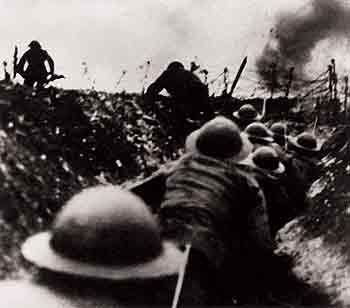-J.R.R. Tolkien
The centenary of the First Day of the Battle of the Somme has been commemorated around the world today. Rather than write a lengthy post, I’ll just cite some figures, images, and quotations.
John Garth: Tolkien and the ‘animal horror’ of the Battle of the Somme.
BBC: Tolkien and the Somme
Poster to encourage men to enlist into Lord Kitchener's New Army.


Casualties, 1 July 1916
British Expeditionary Force total men killed: 19,240
British Expeditionary Force total casualties: 57,470
“While his company was waiting to go over, the wounded from an earlier part of the attack began to crowd into the trenches. Then part of the regiment in front began to retreat, throwing Edward's men into a panic. He had to return to the trenches twice to exhort them to follow him over the parapet. About ninety yards along No-Man's-Land, Edward was hit by a bullet through his thigh. He fell down and crawled into a shell hole. Soon afterwards a shell burst close to him and a splinter from it went through his left arm. The pain was so great that for the first time he lost his nerve and cried out. After about an hour and a half, he noticed that the machine-gun fire was slackening, and started a horrifying crawl back through the dead and wounded to the safety of the British trenches.”
- Description of Edward Brittain on 1 July 1916 from Letters of a Lost Generation, made famous by his sister Vera Brittain’s memoir Testament of Youth. Edward would later be killed in action in 1918 – Vera Brittain’s fiancé, two closest male friends and brother would all be killed in the First World War.
“It was a magnificent display of trained and disciplined valour, and its assault only failed of success because dead men can advance no further.”
- Major-General Sir Beauvoir De Lisle describing the Royal Newfoundland Regiment’s attack on July 1. The Dominion of Newfoundland suffered 90% casualties on July 1, 1916.
“A day of downs and ups. I visit two casualty-clearing stations. They were very pleased at my visit, the wounded were in wonderful spirits. Reported today that total casualties are estimated at over 40,000. This cannot be considered severe in view of numbers engaged and the length of front of attack. By nightfall the situation is much more favourable than when we started today.”
- Field Marshal Douglas Haig, commander of the British Expeditionary Force
“…but I was dead, an hour or more.
I woke when I’d already passed the door
That Cerberus guards, and half-way down the road
To Lethe, as an old Greek signpost showed.”
- Robert Graves, who was badly-wounded and reported dead later in the battle.
“…the flies are again a terrible plague, and the stench from the dead bodies which lie in heaps around is awful.”
- Harold Macmillan, future Prime Minister of the U.K., wounded in the battle
“He was intellectually one of the most distinguished young men of his day and beautiful to look at, added to which he was light in hand, brilliant in answer and interested in affairs. When he went to Balliol he cultivated a kind of cynicism which was an endless source of delight to the young people around him; in a good-humoured way he made a butt of God and smiled at man. If he had been really keen about any one thing - law or literature - he would have made the world ring with his name, but he lacked temperament and a certain sort of imagination and was without ambition of any kind. In spite of this record, a more modest fellow about his own achievements never lived.”
- Description of Raymond Asquith, barrister and son of Prime Minister H. H. Asquith from his stepmother. Asquith was one of a number of high profile young men killed in the battle, and some referred to his death as the end of Edwardian Age.
“What passing-bells for these who die as cattle?
Only the monstrous anger of the guns.”
- Wilfred Owen, poet and writer, killed in battle November 1918.
Total Allied Casualties, Battle of the Somme 1 July 1916 - 18 November 1916: 794,238
Total Central Powers Casualties: 537,918
Maximum Allied Advance: 11 miles

